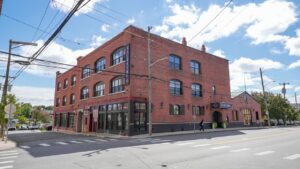Westchester commercial property market ends Q2 with mixed results Â

The Westchester County commercial market ended the first half of 2023 with mixed results, showing continued strength in multifamily developments and solid performance in the industrial/flex market while demand for retail space weakened modestly and office buildings struggled with lower occupancies due to the work- from-home environment. These are the market trends highlighted in the Houlihan Lawrence Q2 commercial market report.
“Despite some pockets of weakness, commercial real estate space demand in Westchester has been resilient,” said Garry Klein, managing director of Houlihan Lawrence Commercial Division. “The greatest immediate risk to commercial real estate is the lack of available financing liquidity to investors. Recent bank failures have placed a spotlight on regional lenders, and regulators will be on high alert when scheduled reviews take place.
“In summary, the service segment of the economy is currently the strongest engine of economic growth, at a local and national level. Importantly, services industries, key to Westchester County”™s economic health, employment and commercial real estate occupancy, have solid prospects, over the near and medium term, due to favorable demographics that have become stronger in the post-pandemic period.”
Residential apartments maintain their shine
After reaching a vacancy high of 4.6% in Q3 of 2022, Westchester multifamily occupancy improved during the subsequent quarters, and vacancy now stands at 3.8%. During the quarter, 612 units, equivalent to 1% of the area inventory of apartment units, were delivered and absorbed. At the same time, concessions have declined, and effective rents have increased. The remarkable strength of the multifamily segment of the market persists.
Rebounding apartment rents in Manhattan, the appeal of strong educational and medical systems, proximity to parks and other open- air recreation, in addition to attractive pricing ascompared to New York City, have continued to support demand for apartments in lower Westchester. In addition, difficult single-family affordability is keeping households renting for longer than expected. Several local municipalities and cities, such as New Rochelle, Port Chester, White Plains and Yonkers have enacted zoning initiatives that encourage apartment construction in proximity to transportations hubs, and the pipeline of new projects is meaningful at more than 10% of existing stock.
Retail space demand somewhat weakens
During the quarter, demand and pricing for retail space weakened, albeit marginally. Leasing activity declined and fewer deals were completed. There was no activity in sublet retail space and overall occupancy declined as retailers gave back space. Despite sluggish fundamentals, rents have remained relatively stable, with overall inflation helping landlord pricing power. New deliveries, primarily on the ground floor in new residential projects, have had difficulty leasing in an environment where fears of an impending decline in economic activity are widespread and prospective tenants are price-sensitive.
Retail shops and retailers remain under transformative pressure, in response to consumer demand and preference changes that have taken place post-pandemic. Personal services and fast-food hospitality industries have emerged as the driving force of retail demand, especially in areas of above-average disposable income, such as southern Westchester. Several bigbox retailers have failed, are being acquired or are currently under stress. After filing for bankruptcy in May, the Christmas Tree Shops is now in the process of liquidating its 70 stores in 20 states, including 11 in New York state and four in Connecticut. (At the Hartsdale location, dwindling stock was on offer for 20% off. Those we spoke with were not sure when the store would actually close.)
The Christmas Tree Shops group was formerly owned by the bankrupt Bed, Bath & Beyond, whose intellectual property was acquired for $21.5 million at auction by Overstock, which will rebrand itself under the B, B & B name.
Meanwhile, town centers have seen a resurgence of ethnic or health-food franchises or groups. Among other trends: Medical services are migrating to select retail areas where parking is available. Physical fitness concepts are looking for well-located retail in side streets. Beauty concepts, searching for convenient and affordable retail space, are willing to sacrifice visibility. These trends are gradually changing the shape of in-town retail areas as well as shopping centers across Westchester.
For more, visit houlihanlawrence.com.